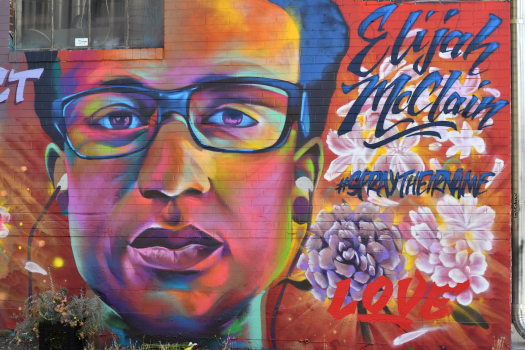In response to the recent uprisings across the U.S., several previously closed or dismissed cases of police brutality have received renewed attention. One such case is that of Elijah McClain, a Black 23 year-old who was murdered by police in Aurora, Colorado last fall.
On the evening of August 24th, McClain was walking home from a convenience store when he was stopped by three cops. The Aurora Police Department had received a call about a “suspicious person” wearing a ski mask, and the officers violently confronted McClain. They tackled him and placed him in a carotid chokehold, cutting off blood flow to his brain.
The cops then called first responders to the scene who injected McClain with ketamine to sedate him. (EMTs and first responders increasingly use ketamine at the request of police officers, even for restrained individuals such as McClain). On his way to the hospital, Elijah McClain had a heart attack, and he was taken off life support on August 30th after being declared brain dead.
The Aurora Police Department did not release body camera footage until months later, and initially claimed that the cameras had fallen off during the confrontation with McClain. In the footage, police can be heard threatening and brutalizing him as he sobs, vomits, apologizes, and begs, “I’m so sorry. I have no gun. I don’t do that stuff… Why are you attacking me? … Forgive me.” Some of his final words echo those of Eric Garner and George Floyd: “I can’t breathe.”
Although the officers were placed on administrative leave following the incident, no charges were filed. The three cops claimed that McClain — who weighed only 140lbs — showed “extreme” strength, and the Coroner’s office helped shield the police from accountability by calling his death “undetermined.” The autopsy report states that, “[He] was violently struggling with officers who were attempting to restrain him. Most likely … physical exertion contributed to death. It is unclear if the officer’s actions contributed as well.” District Attorney Dave Young said that there was no proof that police used “unjustified” force against McClain, and defended the officers’ behavior as consistent with their training and department policies.
On Thursday, in response to increasing outcry on social media, Colorado governor Jared Polis announced that his administration and Attorney General will reopen and investigate the case. Elijah McClain’s murder has come under scrutiny because of the recent uprisings against police, but also because of the jarring contrast between the brutality of his murder and his gentle nature. He taught himself to play the guitar and the violin, and would play music at animal shelters to calm the animals and keep them company. He was described by friends as having a kind, “child-like spirit.” He often wore ski masks due to his chronic chills from anemia and to help alleviate his social anxiety, according to a friend. In the body camera audio, he can be heard saying, “Let go of me. I am an introvert. Please respect the boundaries that I am speaking.”
The Aurora Police Department’s treatment of McClain is in stark contrast to their treatment of James Holmes, the white mass-shooter who killed 12 people and injured 59 others in a movie theater in 2012. Holmes entered a midnight movie screening heavily armed, and gunned down moviegoers with his assault rifle. The police took Holmes into custody and allowed him to peacefully surrender in the parking lot. McClain, an innocent young Black man, was instantly attacked by the police and left braindead. Holmes, a mass-murder, emerged unscathed from his police interactions.
McClain’s is one of several cases of police murder that have received renewed attention and demands for police accountability. People are also seeking justice for Breonna Taylor of Louisville, Derrick Scott of Oklahoma City, Cameron Lamb of Kansas City, Nicholas Chavez of Houston, and Javier Ambler of Austin. The list of victims of police violence is seemingly endless, and cops have continued to brutalize and kill with impunity even during the recent uprisings.
The police and the racist capitalist system that they “protect and serve” cannot be reformed. Elijah McClain’s murder demonstrates that the rot runs straight to the core, including the racist 911 call, the cops’ sadistic behavior, the responders’ casual sedative injection, the cover-up by the Coroner’s office, and the dismissal by District Attorney. Tepid reforms such as chokehold bans or verbal warnings before shooting will not stop the systemic murder of people of color by the police, whose very purpose is to oppress. We must demand justice for Elijah McClain and all victims of police violence by demanding full police abolition.











